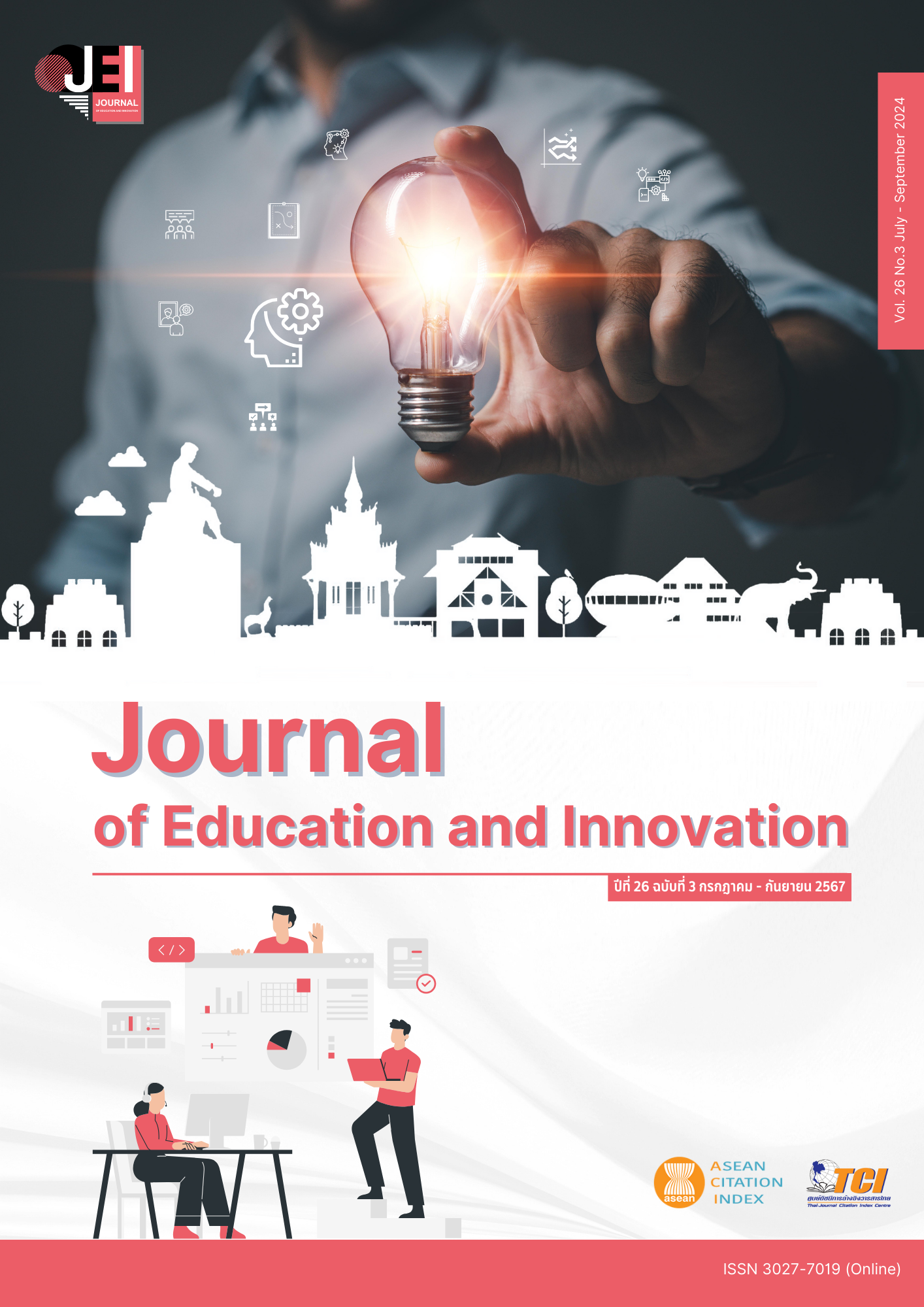GEOGRAPHY INSTRUCTIONAL MODEL BASED ON CONSTRUCTIVIST THEORY TO ENHANCE LEARNING ABILITIES FOR ELEMENTARY SCHOOL STUDENTS THE SCHOOL IS AFFILIATED WITH MUANG MAI PATTANA EDUCATION NETWORK, MUANG DISTRICT, SONGKHLA PROVINCE
Main Article Content
Abstract
The objectives of this research were 1) to analyze of a geography instructional model based on constructivist theory to enhance learning abilities for elementary school students and 2) to evaluate the use of the development of a geography instructional model based on constructivist theory to enhance learning abilities for elementary school students. The sample group was elementary 3 students of Ban Nam Kra Chai School and Ban Klang School, Mueang Songkhla District, Songkhla Province who studied the Social Studies, Religion and Culture subject group in the second semester of the academic year 2022. There were 2 classrooms, 30 students each Data were analyzed using mean values, standard deviation and T-test independent. The research findings were as follows: 1) Geography instructional model based on constructivist theory consisted of (1) principles; (2) objectives; and (3) 5-step learning process, namely Determine the problem of geography, Learn and practice geography, Reflection of geographic ideas, Create knowledge and Present geographic work, Evaluation of geography and (4) conditions for applying the model. And 2) the effectiveness of the model, It was found that (1) Students who receive geography instruction based on constructivist theory Efficiency was 82.84/84.08 percent which is by the specified criteria; (2) The students receiving geography instruction based on constructivist theory and normal instruction differed at statistically significant difference at the .05 level. higher than normal students; and (3) Students were satisfied with teaching and learning using the model at the highest level.
Article Details

This work is licensed under a Creative Commons Attribution-NonCommercial-NoDerivatives 4.0 International License.
The owner of the article does not copy or violate any of its copyright. If any copyright infringement occurs or prosecution, in any case, the Editorial Board is not involved in all the rights to the owner of the article to be performed.
References
Anthony, R. N. (1996). Planning and control system: A framework for analysis. Boston Massachusetts: Division of Research, Harvcord Business School.
Ausubel, D. P. (1963). Education psychology: Cognitive view. New York: Hold Rinehatt and Winston.
Best, J. W. (1986). Research in education (5th ed.). New Jersey: Prentice Hall.
Brooks, J. G., & Brooks, M. G. (1993). Search of understanding: The case for the constructivist classroom. Alexandria, VA: ASCD. Bruner, J. (1963). The process of education. New York: Alfred A. Knopf and Random House.
Casanova, V. S., & Paguia, W. M. (2022). Expectations, experiences, and satisfaction of the graduate students with distance online learning environment in OMSC graduate school during the Covid-19 Pandemic. Journal of Practical Studies in Education, 3(1), 14-22.
Chanhom, P. (2016). Development of learning management model to develop the ability to transverse Artistic knowledge of art education students (Doctoral dissertation). Bangkok: Chulalongkorn University.
Clements, D. H. (1997). (Mis) Constructing constructivist. Teaching Children Mathematics, 4(4), 198-200.
Dechakupt, P., & Yindeesuk, P. (2017). Teacher 4.0.’s 7C Skills. Bangkok: Chulalongkorn University Press.
Driscoll. (1994). Psychology of learning for instruction. New Jersey: Allyn and Bacon.
Eija, Y., Eila., J., & Piia, L. (2020). Teaching and learning methods in geography promoting sustainability. Education Sciences Online (RIGEO), 1(5), 1-18
Favier, T., & Schee, J. V. (2014). Evaluating progression in students’ relational thinking while working on tasks with geospatial technologies. Review of International Geographical Education Online (RIGEO), 4(2), 155-181.
Gaydos, M. (2021). Co-designing educational games for classrooms. International Journal of Designs for Learning, 12(1), 54-63.
Gredler, M. E. (1997). Learning and instruction: Theory into practice (3rd ed.). Upper Saddle River, NJ: Prentice Hall.
Hanifah, M., Mohmadisa, H., Yazid, S., Nasir, N., & Balkhis, N. S. (2019). Professional and pedagogical competencies of form six geography teachers in Malaysia. Review of International Geographical Education Online (RIGEO), 9(2), 304-318.
Jirangsuwan, N. (2015). Design and evaluation principles. Bangkok: University Textbook Production Center King Mongkut's Technology North Bangkok.
Kuş, Z. (2021). Geography and Identity: An analysis of geography curricula in Turkey. Romanian Review of Geographical Education, 10(2), 67-87.
Ministry of Education. (2008). Social Studies Subject Group Learning Management Manual Religion and Culture. Bangkok: krusapa Ladprao Publishing.
Panich, W. (2012). Learning for students in the 21th century. Bangkok: Sodsri-Saritwong Foundation.
Pornkul, C. (2009). Teaching, thought processes, theories, and applications. Bangkok: V Print (1991).
Ridha, S., Utaya, S., Bachri, S., & Handoyo, B. (2019). Students’ geographic skills in Indonesia: Evaluating GIS learning material questions using taxonomy of spatial thinking. Journal of Social Studies Education Research, 10(4), 266-287.
Robertson, M., Maude, A., & Kriewaldt, J. (2019). Aligning mapping skills with digitally connected childhoods to advance the development of spatial cognition and ways of thinking in primary school geography. Geographical Education, 32(1), 15-25.
Satitpong, P. (2017). Development of a system of teaching geography in the background For High School Students first (Doctoral dissertation). Chonburi: Burapha University.
Shulsky, D. D., Baker, S. F., Chvala. T., & Willis, J. M. (2017). Cultivating layered literacies: Developing the global child to become tomorrow’s global citizen. International Journal of Development Education and Global Learning, 9(1), 49–63.
Suwanvej, K. (2015). Development of teaching and learning models to promote geography teaching competencies for Professional Social Studies Teacher Students (Doctoral dissertation). Nakornpathom: Silpakorn University.
Thomas-brown, K., & Richards, A. (2015). Critical Intersections of Knowledge and Pedagogy: Why the Geographic Literacy of Preservice Elementary Teachers Matter? Review of International Geographical Education Online (RIGEO), 5(3), 249-273.
Tomčíková, I. (2020). Implementation of inquiry-based education in geography teaching–findings about teachers´ attitudes. Review of International Geographical Education (RIGEO), 10(4), 533-548.
Vygotsky, L. S. (1978). Mind in society: The development of higher psychological. Cambridge, Ma: Harvard University Press.
Yenglik, K. (2022). Didactics of modern lessons in the modernisation of geographical education. Cypriot Journal of Educational Science, 17(7), 2207-2221.


